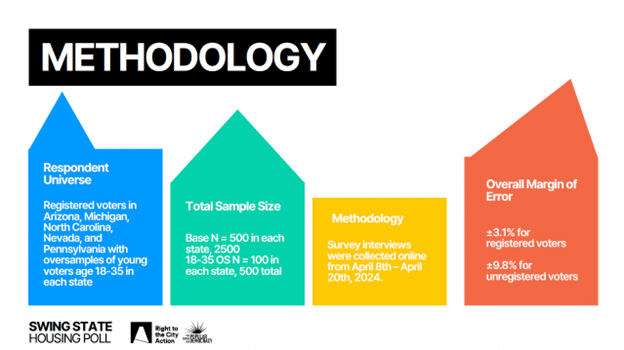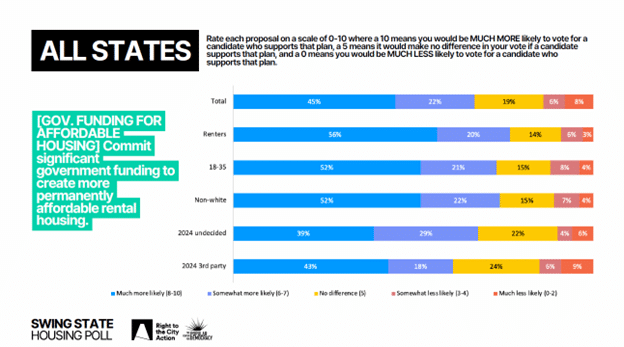Housing Affordability A Top Priority for Voters, Yet Political Candidates Rarely Mention It, Survey Finds
By Pamela Martineau
4 min read
Nearly 60 percent of surveyed voters cite the lowered cost of housing and rent as key factors that would improve their lives, yet say those same issues are at the near bottom—12th—of issues they hear politicians speak of.
These data points are among the findings of the Swing State Housing Poll survey conducted from April 8 to 20 this year by HIT Strategies. The survey, conducted in the swing states of Arizona, Michigan, Pennsylvania, Nevada and North Carolina, was commissioned by the Center for Popular Democracy and Right to the City of Action.
The survey also found that the issues of permanent affordable housing and rent stabilization are popular among both Democratic and Republican voters.
“The biggest takeaway from this survey is that housing is the number one issue on everyone’s mind, and it will be a driving force in November,” says Katie Goldstein, director of housing and healthcare campaigns at the Center for Popular Democracy. “A majority of voters—but younger voters and renters especially—feel that housing affordability and rent prices are top issues for them. They are also the issues that they hear the least about from candidates. Voters want to hear what candidates plan to do about astronomical housing prices and how they can turn things around, so they are able to afford to remain in their communities.”
The survey was conducted among 2,500 registered voters, some 500 in each swing state. Of the surveyed voters, 100 voters in each state were between the ages of 18 and 35. The survey had a margin of error of 3.1 percent.
Younger Voters and Renters Especially Want Housing Affordability To Be More of A Campaign Issue
Younger voters and renters especially stated that they see a large gap between how little politicians speak of housing affordability and how large an impact the issue has on their personal lives. Some 51 percent of renters report not hearing politicians talk much or at all about housing affordability, but 82 percent of surveyed renters believe that improved affordability would better their situations.
Surveyed voters said they believe other issues garner more attention from politicians. Some 81 percent said politicians speak of abortion a lot or some; 72 percent said those running for office speak of immigration a lot or some; and 66 percent cited inflation as an issue spoken of a lot or some.
The survey also found that “aggressive government action to address housing costs” garnered broader support than market-based solutions and attracted the support of Republicans, even those who report “wanting government to get out of their way.” Around 60 percent of surveyed Republicans state that they are more likely to vote for a candidate who supports government action on housing costs. Some 77 percent of surveyed renters stated they would be more likely to support a candidate that supports rent stabilization, as opposed to 67 percent of homeowners who would support the policy.
Renters also were eight percentage points more likely to support increased funding for supportive housing to help homeless people. Some 74 percent of renters supported such increased funding as opposed to 66 percent of homeowners.
The survey also captured a snapshot of renters who participated. Some 59 percent were between the ages of 18 to 35; 77 percent were not college educated; 47 percent were white, non-college educated; 85 percent made under $75,000 a year; and 20 percent of the surveyed renters were Black.
Only 58 percent of the renters surveyed said they believe they will “definitely” vote in the upcoming election, as opposed to 78 percent of homeowners.
“This is a stark drop-off from the 85 percent of renters in this battleground electorate that self-reported turning out in the 2020 election,” the report states.
Recommendations to Politicians: Target Renters on the Issue of Housing Affordability
The Center for Popular Democracy makes recommendations at the end of the report to politicians wishing to message the public on the issues of housing affordability.
“While there is little downside to broadly communicating with these battleground state voters about the cost of rent and housing,” the report states, “targeted communication to renters can be especially effective for both persuasion and mobilization.”
The report also recommended communicating with voters on government policy solutions to affordability, rather than market-based solutions.
“Communicating with voters, especially renters, about policy solutions that involve an active and direct role of government in controlling rents and creating more affordable rental housing is likely to resonate more effectively than market-based solutions,” the report states.
“Additional research would be needed to better understand how these proposed solutions would be received by voters when communicated through more partisan messaging,” the report continues. “But the preliminary indication is that at least for some working-class voters, voters of color and younger voters—voters who have historically strongly supported Democrats but are now unsure—clear and visible support for these progressive housing policies can be an important part of the strategy to reengage and re-energize the base.”

